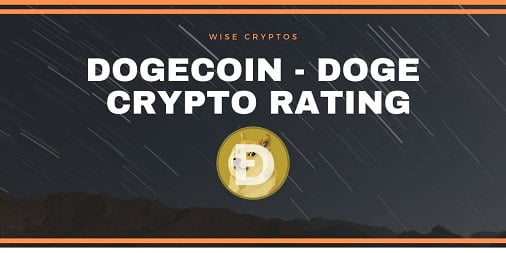Dogecoin Crypto Rating

Unlike most cryptocurrency ratings published online, the Wise Crypto ratings have nothing to do with the current or future price of the currency. Whether or not a crypto is over or undervalued or priced today is completely irrelevant. Our research focuses on the sustainability of each project, the security, the use case, decentralisation, environmental impact, the technology, the scalability and the developers and teams behind the projects.
Top Crypto Casinos List:
See all crypto casinos
Dogecoin (DOGE) Rating= 155/1000
Technology (0 to 300) = 125
- Speed (0 to 50) = 30
Dogecoin transaction speed is quite fast for a POW coin. It takes a minimum of 30 seconds to a maximum of 1 minute to process a transaction in the next Dogecoin block. This is fast compared to Bitcoin, which takes an average of 10 minutes to confirm transactions but slow compared to the top cryptos.
- Cost (0 to 50) = 30
The cost of transactions on the Dogecoin platform is reasonable and affordable. While the transaction cost varies greatly depending on the network, users pay at least 1 DOGE per 1000 bytes of transaction size. The transaction fee is dependent on the amount of space the transaction takes on the block.
- Scalability (0 to 50) = 20
Dogecoin is scalable when compared to Ethereum and Bitcoin. It can handle 10x the volume of these other coins (BTC and ETC) without experiencing scalability problems. The platform is planning to implement the Segwit and Lightning systems to make it even more scalable (if those systems ever become fully functional). Additionally, Dogecoin is solving Ethereum’s scalability issues through Truebit, which allows users to exchange dogecoins from the Dogecoin blockchain to ether tokens on the Ethereum blockchain.
- Environmental Impact (0 to 50) = 40
Just like Bitcoin, DOGE uses a mining system for maintaining a blockchain. Miners have therefore rewarded DOGE for verifying transactions. However, unlike Bitcoin, which employs SHA-256 in its mining system. DOGE leverages a traditional mining system that is based on the Scrypt algorithm. This translates to lower electricity consumption and consequently reduced environmental impact. If DOGE ever becomes used though it remains to be seen how the consumption would increase.
- Reliability (0 to 50) = 5
The fact that DOGE facilitates fast transactions at a lower cost makes it reliable as an exchange of funds. It can effectively be used to reward other Internet users. However, the lack of widespread acceptance reduces its reliability and hampers its use. There are also vulnerabilities in the protocol which could be exploited in the future.
- Decentralization (0 to 50) = 0
Dogecoin’s governance structure is officially semi-centralized. It’s not fully decentralized as the foundation exercises some control over the circulation and usability of the coin. The fact that its officially labelled as semi-centralized may spark fears among the community. The proof of work algorithm also faces severe centralisation issues.
Security (-250 to 0) = -200
- 51% Attacks and Dogwallet Attack (-100 to 0) = -100
On December 25, 2014, a Dogecoin wallet called Dogewallet was hacked, and hackers stole 21 million Dogecoin, which is worth about 12,000 USD. The Dogecoin community raised 13,000 USD to compensate those who have lost their money. Dogecoin blockchain is also susceptible to 51% attacks where more than half of the mining power comes under the control of a single entity.
- Potential for Being Banned (-100 to 0) = -50
While Dogecoin has abided by all the regulations governing the crypto sector, it faces a possible ban due to fraud. In September 2017, a member of the Dogecoin community was arrested in Britain for fraud. He opened a Dogecoin exchange called Moolah, which soon went bankrupt. These fraud allegations are serious and can negatively impact Dogecoin. The proof of work consensus mechanism is also ripe for being banned.
- Network Vulnerabilities (-50 to 0) = -50
Dogecoin has serious network vulnerabilities that raise even more security concerns. A hacker exploiting vulnerabilities in its Synology network attached storage boxes and was able to mine $620000 in Dogecoin. Other minor vulnerabilities experienced on the network is slow verification process and susceptibility to spam transaction attack.
Use Cases (0 to 500) = 210
- Initial Main Use Case (0 to 100) = 5
Dogecoin began as a joke to be a fun currency and was named after the doge meme of Shiba Inu. However, the coin got quick acceptance as an alternative to Bitcoin and was able to thrive. The initial main use case was to provide a means of payment to rival Bitcoin. It’s currently one of the preferred cryptocurrency to reward content creators on different platforms such as Reddit and Twitter. Apart from tipping content creators on the social media platform, Doge can also be used to send micropayments to recipients across borders. It can also be used as a means of payment for the purchase of products and services.
- Mainnet Live (0 to 200) = 200
Dogecoin was forked from an existing cryptocurrency referred to as Luckycoin, which features a randomized reward that is received for mining a block. Luckycoin is also based on Litecoin, which also leverages the Scrypt technology in its proof-of-work algorithm. Dogecoin went live on December 6, 2013, and jumped nearly 300% in value in 72 hours.
- Additional Use Cases (0 to 100) = 0
None
- Additional Working Products (0 to 100) = 5
A notable product launched by the Dogecoin development team is the dogethereum bridge, which allows interoperability between Dogecoin and Ethereum. The team also launched Dogecoin wallets: Dogecoin Core and MultiDoge wallets.
Core Team, Partnerships & Developers (0 to 200) = 20
- Core Team & Developers (0 to 100) = 10
Dogecoin development team is led by Billy Markus, who is the co-founder and programmer of Dogecoin. Markus wanted to create friendly crypto that is not stiff like other digital currencies. Jackson Palmer is the co-founder of Dogecoin and leads the marketing team. Dogecoin has a strong community behind it.
- Partnerships (0 to 100) = 10
Dogecoin has partnered with other organizations, including Doge4Water and NASCAR. Doge4Water is a charity fundraising initiative that was started by the Dogecoin foundation in 2014 that raised $30,000 to fund clean water projects in Kenya. The dogecoin community raised $55,000 Dogecoin in 2014 to sponsor NASCAR driver Josh Wise, and Kabosu, the famous Doge Shiba-Inu, was painted on the Wise’s car as a result.
Visit the following page for an overview of all the Dogecoin Casinos.
Relevant news

Zcash Crypto Rating
Unlike most cryptocurrency ratings published online, the Wise Crypto ratings have nothing to do with…

Algorand Crypto Rating
Unlike most cryptocurrency ratings published online, the Wise Crypto ratings have nothing to do with…

Voyager (VGX, Ethos, BQX) Token Crypto Rating
Unlike most cryptocurrency ratings published online, the Wise Crypto ratings have nothing to do with…

OmiseGo Crypto Rating
Unlike most cryptocurrency ratings published online, the Wise Crypto ratings have nothing to do with…

MaidSafeCoin / SafeCoin Crypto Rating
Unlike most cryptocurrency ratings published online, the Wise Crypto ratings have nothing to do with…

DigiByte Crypto Rating
Unlike most cryptocurrency ratings published online, the Wise Crypto ratings have nothing to do with…
